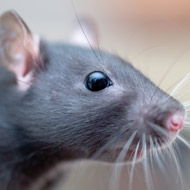Rat owners urged to practise safe handling

Researchers pinpointed 24 people in Canada and the US who developed acute Seoul virus infections after contact with pet rats.
Rat owners are being urged to practise safe handling following an outbreak of Seoul virus amongst humans in the United States.
According to Morbidity and Mortality Weekly Report, doctors in the US and Canada have seen cases of Seoul virus infection in humans who contracted the virus from their pet rats.
Speaking to Reuters Health, Dr Janna Kerins of the U.S. Centers for Disease Control and Prevention (CDC) said: “In December 2016, a patient in Wisconsin was hospitalised for fever and a low white blood cell count and ultimately tested positive for Seoul virus. Soon after, a family member developed similar symptoms and also tested positive.”
Following confirmation of the infection, the CDC and the Wisconsin Department of Health Services launched an investigation into the source of the disease. Dr Kerins, who co-authored the report, said that the outbreak spread from sales or trade of infected pet rats between people’s homes or where they are bred, in 11 states.
Researchers pinpointed 24 people in Canada and the US who developed acute Seoul virus infections after contact with pet rats. Kerins said that eight became ill and three were hospitalised but made a full recovery.
Seoul virus is a type of hantavirus found in the Norway rat. Rats infected with the disease are asymptomatic but can transmit the virus to humans through infectious saliva, urine, droppings, or aerosolization from contaminated bedding. Signs and symptoms in humans range from mild influenza-like illness to hemorrhagic fever with renal syndrome.
“This is a good reminder that rats and other rodents can carry hantavirus without looking sick, so it is important for owners of pet rats to be aware of the risk for Seoul virus infection, and to practice good hand hygiene . . . such as washing hands after handling rodents and before preparing food, and by avoiding rat bites and scratches,” Kerins said.



 The RCVS has announced a new version of its 1CPD mobile app, with enhanced features for veterinary surgeons and veterinary nurses to record their continuing professional development.
The RCVS has announced a new version of its 1CPD mobile app, with enhanced features for veterinary surgeons and veterinary nurses to record their continuing professional development.